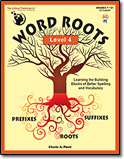Eighth Grade Language Arts
This Grade 8 textbook covers parts of speech, three-point expository paragraph writing, special cases of subject/verb agreement, first person narratives, subordinate conjunctions, pronouns cases, writing a research report, participles, gerunds, infinitives, compound-complex sentences, writing a resume, and more.
This book is designed to be used with the Teacher’s Manual and Jingle CD
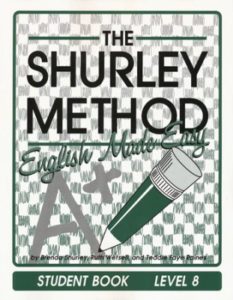
This 136-page book is comprised of intriguing activity pages to wake up sleepy brains for the day’s lessons. Each activity page takes about 5-15-minutes to solve and develops the most important reading comprehension skill found on all standardized reading tests. Synthesizing disparate information and using the result to produce a reasonable conclusion is an essential skill assessed on standardized reading tests. This comprehension skill usually determines a student’s reading score–and every Daily Mind Builders™: Language Arts activity develops this skill.
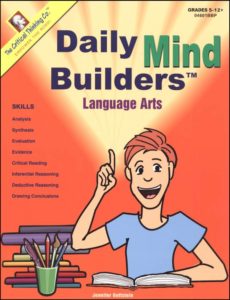
Each lesson within the Level 8 spelling and vocabulary program contains 20 list words. List words are much more difficult than those used in prior levels. This level is difficult enough for eighth grade to high school students. Lessons contain games such as pronunciation of words, proofreading, deciphering puzzles, word jumbles, crossword puzzles, word search, definition matching, unscrambling words, identifying misspelled list words in a paragraph or sentence, alphabetizing word groups, and complete the sentences. These exercises are more difficult than those in previous levels. Learn More
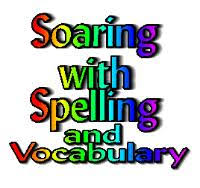
Students should complete All About Spelling Level 6 before starting Level 7. All About Spelling is a building block program: each level builds upon the previous one. In order to build a strong foundation, most students start with Level 1. Learn More
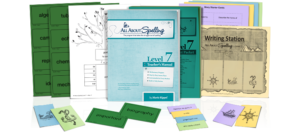
Help your students improve their spelling in developmental stages, moving gradually from simple sound-letter relationships to more complex word-structure patterns. This teacher’s edition provides a 3-day or 5-day plan; activities for reinforcing spelling patterns; dictation sentences for a pre-test and final test; bonus words; review lessons; tips for ESL learners; a writer’s corner; and take-it-home masters. The scope & sequence follows MCP’s “Plaid Phonics.” Objectives state the goal of each lesson. Softcover. Level H, Grade 8. Learn More
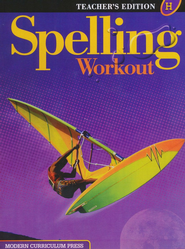
Teach writing skills using this innovative new approach. The Four Square method can be used with all forms of writing and will fit any reading or language arts program. This step-by-step approach is built around a simple graphic organizer that first shows students how to collect ideas and then helps them use those ideas to create clear and polished prose. Open-ended reproducibles make the technique accessible to writers of all ability ranges. Learn More
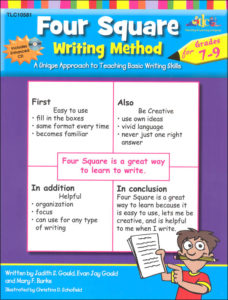
This level covers direct, indirect quotations, divided quotations, dialogue, the writing process, thesis statements, transitional sentences, documenting sources, bibliography, creative writing, personal narrative, descriptive writing, persuasive writing, explanatory writing, informational essay, autobiographical essay, cause, and effect essay, compare and contrast essay, and research report, among other things. Learn More

Grades 6-8 Recorded live with Mr. Andrew Pudewa, this four-DVD writing course for middle school students new to IEW lays a solid foundation of writing skills. Over the course of 15–30 weeks, students will learn how to effectively use a wide range of structural models and stylistic techniques in their compositions, as they write on a variety of enjoyable fiction and non-fiction topics. Included with the student handouts are complete teacher’s notes, source texts, assignments, and checklists. Learn More
Comes with: Student Notebook and Instructional DVDs.
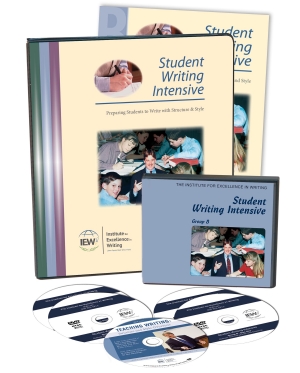
Descriptive adjectives, limiting adjectives, adjectives and commas, comparison with adjectives, predicate adjectives, diagramming predicate adjectives, appositive adjectives and proper adjectives, diagramming adverbs that modify adjectives and other adverbs, comparison with adverbs, using negatives correctly, prepositional phrases used as adjectives, prepositional phrases used as adverbs, diagramming prepositional phrases used as adjectives and adverbs, preposition or adverb,phrases and clauses between a subject and a verb, troublesome verb pairs, conjunctive adverbs, diagramming adverb clauses, adverb clauses, noun clauses, compound-complex sentences, participles and participial phrases, diagramming participles and participial phrases, gerunds and gerund phrases, diagramming gerund and gerund phrases, diagramming infinitives and infinitive phrases. Learn More
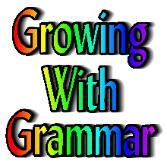
It has been determined that many students find it easier to understand the mechanics of grammar by focusing on diagramming sentences while learning basic grammar concepts. There are 41 lessons in this sentence diagramming book. Each lesson contains sentence diagramming instruction as well as sentence diagramming problems to be completed by the student. The book starts with basic sentence diagramming and progresses through more difficult sentence diagramming concepts. Learn More
Comes With: Workbook and Answer Key.
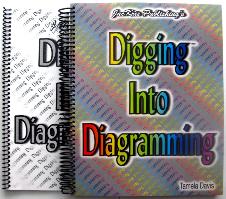
The Improves students’ grammar, punctuation, spelling, capitalization, and attention to detail using a standards-based thinking approach rather than drill and practice. This effective method teaches students to carefully analyze and edit stories. This book includes 16 lessons in grammar and mechanics. Students identify and circle errors in each story and write their correction. The grammatical and mechanical errors in the paragraphs are based on general instructional guidelines for specific grade levels; the content level, however, is ungraded, allowing usage of these materials at many instructional levels. Writing styles and content are varied to sustain interest and to broaden the students’ exposure to different writing formats, such as letters, stories, and dialogue. The illustrations integrated into the context of the activities further spark student interest. The skills developed can be applied to the students’ own writing. Detailed answers are also included. Learn More
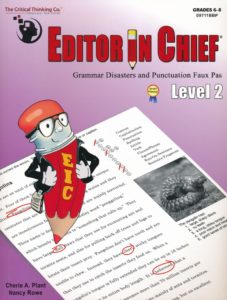
The standards-based critical thinking activities of Reading Detective® develop the analysis, synthesis, and vocabulary skills students need for exceptional reading comprehension. The activities are especially effective at helping students understand more challenging reading concepts such as drawing inferences, making conclusions, determining cause-and-effect, and using context clues to define vocabulary.
Students read and analyze short literature passages and stories that include fiction and nonfiction genres. Then they answer multiple-choice and short-response questions, citing sentence evidence to support their answers.
The Grades 6–12+ remedial (Rx) level is organized into single-skill units with a concluding mixed-skills unit and provides an introductory lesson for each skill.
Rx activities are “prescriptive” to help under-performing students in Grades 6–12+ improve their comprehension skills. Reading level is Grades 4–6; story content is Grades 6+. Learn More
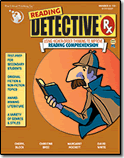
Students learn the meaning and spelling of roots, prefixes, and suffixes commonly used in English. Learning these word elements dramatically improves spelling and the ability to decode unfamiliar words. The activities focus on using these words in context to help students incorporate each word into their vocabulary and retain the correct spelling. There are periodic reviews to make sure students retain what is taught in the lessons. Word Roots books will add hundreds of words to your students’ vocabulary and greater depth to their thinking and writing. Learn More
